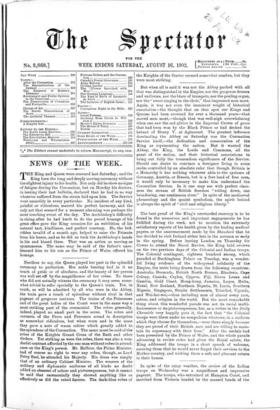But when all is said it was not the Abbey
packed with all that was distinguished in the Empire, nor the gorgeous dresses and uniforms, nor the blare of trumpets, nor the pealing organ, nor the " sweet singing in the choir," that impressed men most. Again, it was not even the imminent weight of historical association—the thought that on that spot our Kings and Queens had been crowned for over a thousand years—that moved men most,—though that was well-nigh overwhelming when one saw the red glitter in the Imperial Crown of gems that had been won by the Black Prince or had decked the helmet of Henry V. at Agincourt. The greatest influence dominating the Abbey on Saturday was the Coronation Service itself,—the dedication and consecration of the King as representing the nation. But it wanted the Abbey, the King, the Lords and Commons, all the great of the nation, and their historical associations to bring out fully the tremendous significance of the Service. Should one desire to convince a foreigner living in some realm controlled by an absolute ruler that though Britain is a Monarchy it has nothing whatever akin to the systems of Germany, Austria, or Russia, but is a free land of free men, it would only be 'necessary to make him understand the Coronation Service. In it one may see with perfect clear- ness the stream of British freedom "rolling down, one broadening, one continuous river." In spite of the mediaeval phraseology and the quaint symbolism, the spirit behind is always the spirit of " civil and religious liberty."


































